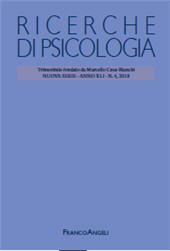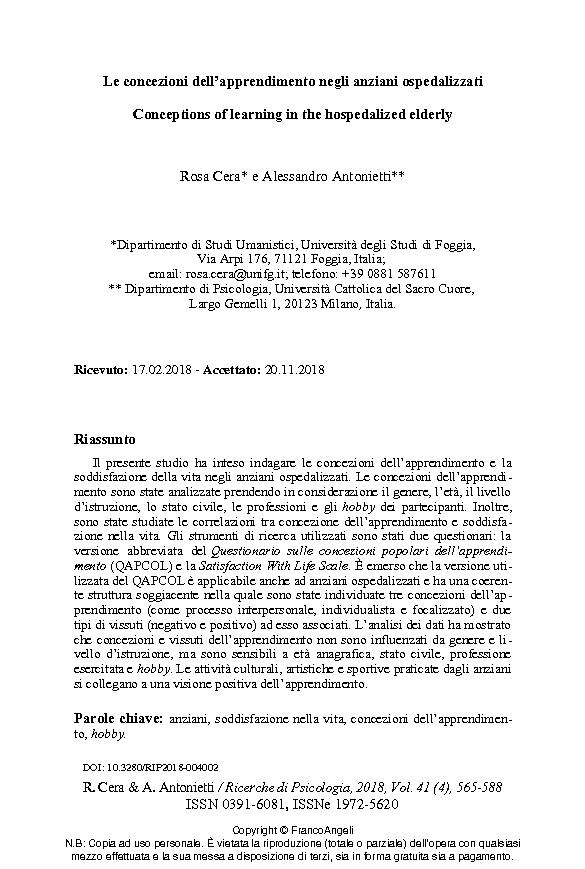Le concezioni dell'apprendimento negli anziani ospedalizzati
565-587 p.
Il presente studio ha inteso indagare le concezioni dell'apprendimento e la soddisfazione della vita negli anziani ospedalizzati. Le concezioni dell'apprendimento sono state analizzate prendendo in considerazione il genere, l'età, il livello d'istruzione, lo stato civile, le professioni e gli hobby dei partecipanti. Inoltre, sono state studiate le correlazioni tra concezione dell'apprendimento e soddisfazione nella vita. Gli strumenti di ricerca utilizzati sono stati due questionari: la versione abbreviata del Questionario sulle concezioni popolari dell'apprendimento (QAPCOL) e la Satisfaction With Life Scale. È emerso che la versione utilizzata del QAPCOL è applicabile anche ad anziani ospedalizzati e ha una coerente struttura soggiacente nella quale sono state individuate tre concezioni dell'apprendimento (come processo interpersonale, individualista e focalizzato) e due tipi di vissuti (negativo e positivo) ad esso associati.
L'analisi dei dati ha mostrato che concezioni e vissuti dell'apprendimento non sono influenzati da genere e livello d'istruzione, ma sono sensibili a età anagrafica, stato civile, professione esercitata e hobby. Le attività culturali, artistiche e sportive praticate dagli anziani si collegano a una visione positiva dell'apprendimento. [Testo dell'editore].
The present study aimed to investigate the conceptions of learning and the satisfaction with life in hospitalized older adults. Opinions on learning have been analyzed taking into consideration participants' gender, age, education level, marital status, job, and hobbies. Furthermore, the correlations between the conceptions of learning and satisfaction with life have been analysed. The research tools used were two questionnaires: the abbreviated version of the Questionnaire About Popular Conceptions of Learning (QAPCOL) and the Satisfaction With Life Scale. It emerged that the abbreviated version of the QAPCOL is also applicable to hospitalized older adults and has a consistent underlying structure in which three conceptions of learning have been identified (learning as an interpersonal, individualistic, and focused process) and two types of feelings (negative and positive) associated with it.
Analyses showed that conceptions of learning are not influenced by gender and education level but are sensitive to age, marital status, job, and hobbies. The cultural, artistic, and sport activities practiced by the older adults are associated to a positive view of learning. [Publisher's text].
Is part of
Ricerche di psicologia : 4, 2018-
Articles from the same issue (available individually)
-
Information
ISSN: 1972-5620
DISCIPLINES
KEYWORDS
- Anziani, soddisfazione nella vita, concezioni dell'apprendimento, hobby



